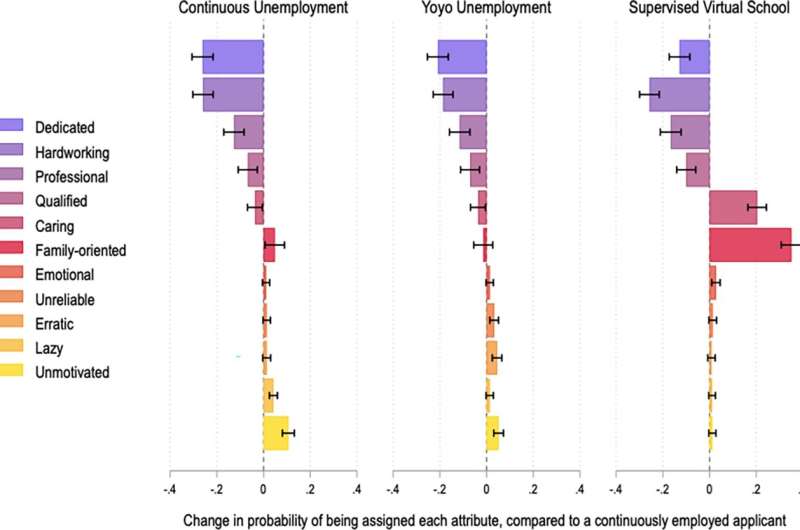This article has been reviewed according to Science X's editorial process and policies. Editors have highlighted the following attributes while ensuring the content's credibility:
fact-checked
peer-reviewed publication
trusted source
proofread
Study shows COVID-19 unemployment stigma is real and could threaten future job prospects

Regina Bateson, an Assistant Professor in the Faculty of Social Science's Graduate School of Public and International Affairs, details the findings of her study. The research, published in PLOS ONE, shows the significant social and economic impacts to individuals who were out of work during the COVID-19 pandemic.
Below she answers questions about her study.
How was this research performed?
In this study, I conducted a pre-registered survey experiment with a nationally representative sample of 974 U.S. adults. I randomly assigned pandemic employment histories to fictional job applicants, then I asked the survey respondents to evaluate the job applicants.
What did you find?
The fictional applicants with pandemic gaps in employment were seen more negatively than identical applicants who worked continuously throughout the COVID-19 pandemic. This was true whether they were laid off and out of work for a long period of time, yo-yoed in and out of employment throughout lockdowns and re-openings, or stopped working to supervise virtual school for their children.
Compared to identical people who remained employed throughout the pandemic, fictional job applicants with pandemic resume gaps are less likely to be seen as professional, qualified, hardworking, motivated, or dedicated. In addition, they are less likely to be selected for hypothetical job openings.
Although pandemic job losses were widespread and beyond workers control, these findings suggest that there is stigma associated with pandemic gaps in employment. The public health emergency may now be winding down, but for people with pandemic resume gaps, the social and economic impact of the COVID-19 pandemic could reverberate for years to come.
How can employers and public bodies assist those with COVID-19 employment gaps?
Throughout the pandemic, governments provided significant assistance to people who were out of work, and there was a widespread perception that pandemic gaps in employment would not be held against job seekers. This research suggests those assurances may have been overly optimistic. Even as the pandemic wanes, governments should remain attentive to the possibility that individuals who were out of work during the pandemic may face discrimination and stigma when they look for new jobs and seek to advance in their careers.
In addition, hiring managers should be aware that negative stereotypes about those who were unemployed during the pandemic could inadvertently affect how they evaluate job applicants.
Any final thoughts?
It is important to note that this research measures perceptions of fictional job applicants, not actual outcomes in the real-world labor market. At present there is high demand for workers, and the hot labor market may be blunting any penalties associated with a pandemic resume gap. However, presumably the job market will cool again at some point—and when that happens, job seekers who were out of work during the pandemic may find themselves at a disadvantage.
Stigma also has negative social and psychological consequences, creating additional burdens for the millions of people who found themselves out of work during the COVID-19 pandemic.
More information: Regina Bateson et al, Perceptions of pandemic resume gaps: Survey experimental evidence from the United States, PLOS ONE (2023). DOI: 10.1371/journal.pone.0281449
Journal information: PLoS ONE
Provided by University of Ottawa




















